Evaluating UPS's Role in B-to-B Customer Relationships and Logistics
VerifiedAdded on 2022/11/24
|7
|1276
|78
Report
AI Summary
This report examines the role of United Parcel Service (UPS) in business-to-business (B2B) customer relationships and logistics. It begins by defining UPS and its transformation into a comprehensive logistics partner, moving beyond simple package delivery. The report then explores the specific requirements of UPS's business customers, such as real-time tracking and flexible shipping options, highlighting how UPS supports these needs. It contrasts UPS's strategies for business consumers with those for residential customers, emphasizing the supply chain and freight services provided to businesses. The report analyzes business buyer behavior within the context of UPS's services, considering factors like cost-effectiveness and the provision of specialized services. The conclusion emphasizes UPS's value proposition for its B2B clients, its positive impact on customer relations, and its overall growth within the global market. The report draws on several academic sources to support its analysis of UPS's strategic approach to the B2B sector.
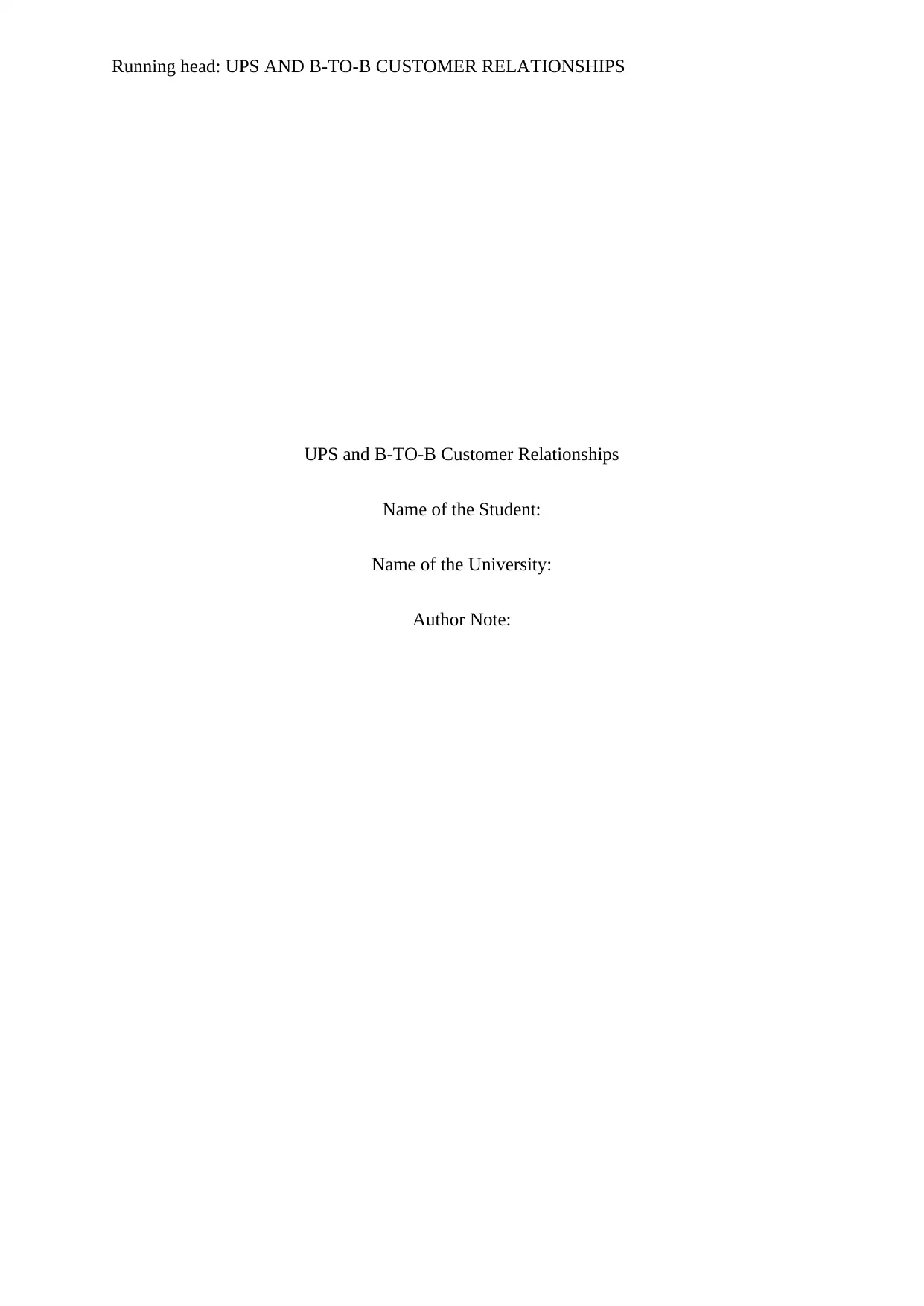
Running head: UPS AND B-TO-B CUSTOMER RELATIONSHIPS
UPS and B-TO-B Customer Relationships
Name of the Student:
Name of the University:
Author Note:
UPS and B-TO-B Customer Relationships
Name of the Student:
Name of the University:
Author Note:
Paraphrase This Document
Need a fresh take? Get an instant paraphrase of this document with our AI Paraphraser
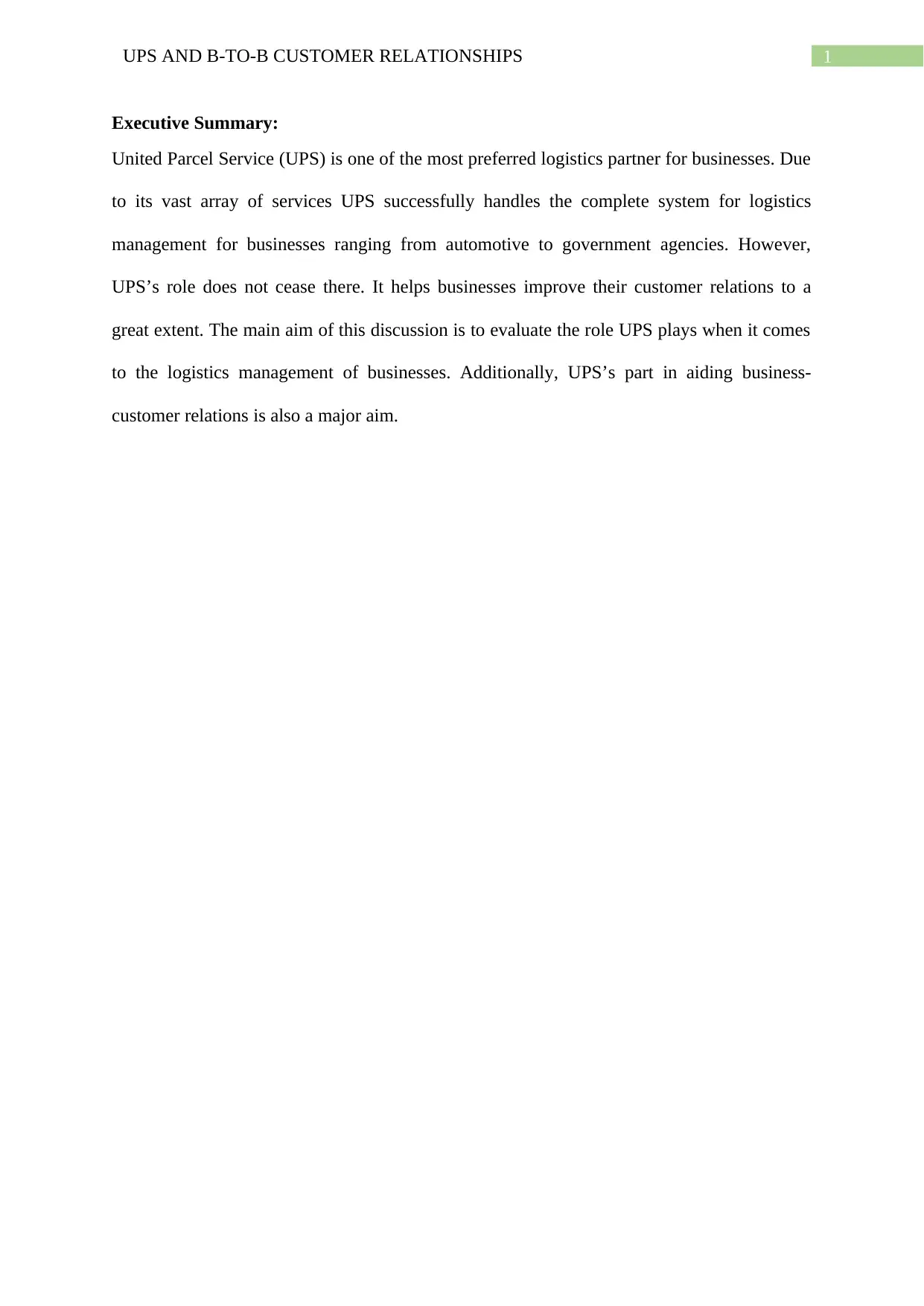
1UPS AND B-TO-B CUSTOMER RELATIONSHIPS
Executive Summary:
United Parcel Service (UPS) is one of the most preferred logistics partner for businesses. Due
to its vast array of services UPS successfully handles the complete system for logistics
management for businesses ranging from automotive to government agencies. However,
UPS’s role does not cease there. It helps businesses improve their customer relations to a
great extent. The main aim of this discussion is to evaluate the role UPS plays when it comes
to the logistics management of businesses. Additionally, UPS’s part in aiding business-
customer relations is also a major aim.
Executive Summary:
United Parcel Service (UPS) is one of the most preferred logistics partner for businesses. Due
to its vast array of services UPS successfully handles the complete system for logistics
management for businesses ranging from automotive to government agencies. However,
UPS’s role does not cease there. It helps businesses improve their customer relations to a
great extent. The main aim of this discussion is to evaluate the role UPS plays when it comes
to the logistics management of businesses. Additionally, UPS’s part in aiding business-
customer relations is also a major aim.
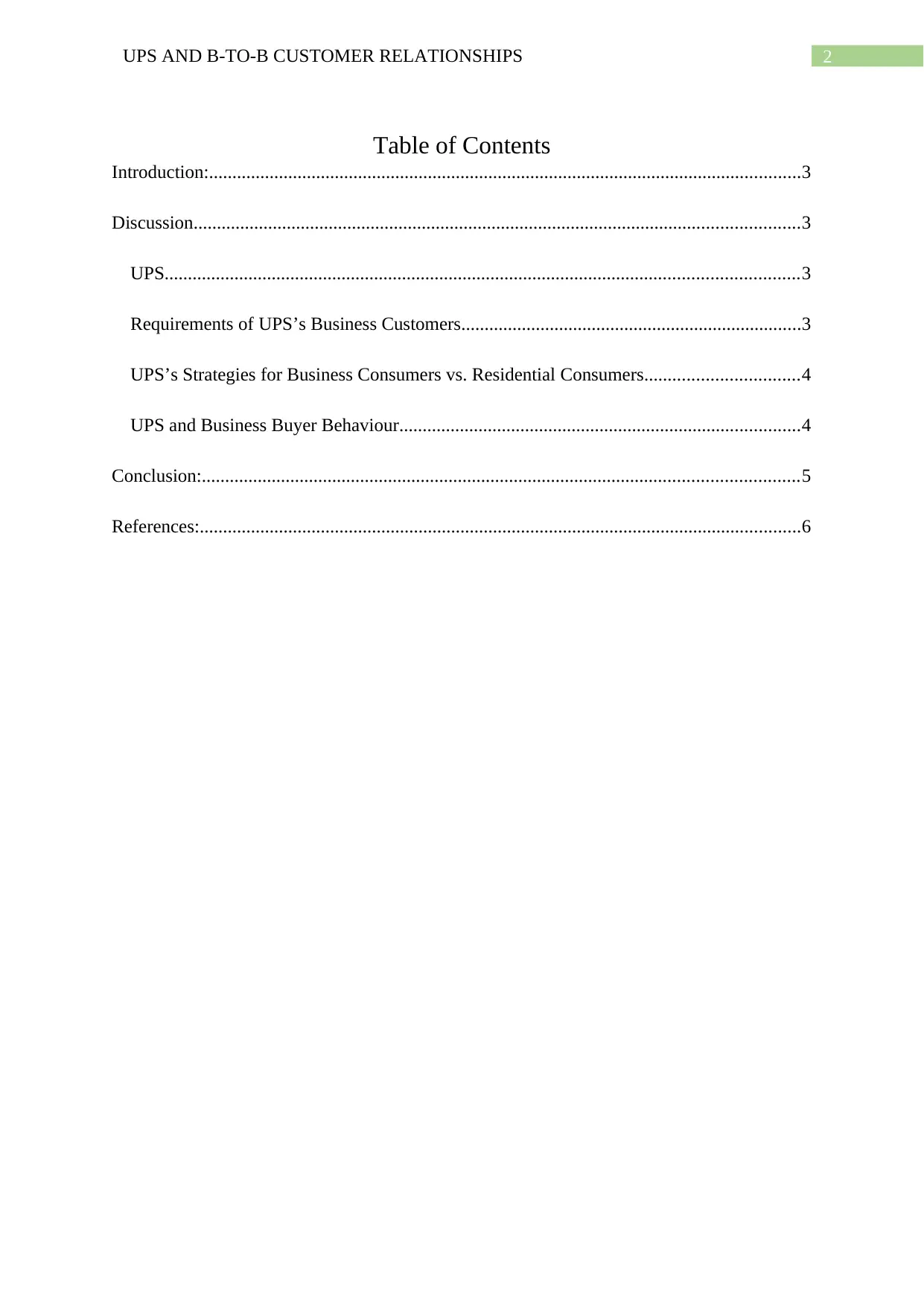
2UPS AND B-TO-B CUSTOMER RELATIONSHIPS
Table of Contents
Introduction:...............................................................................................................................3
Discussion..................................................................................................................................3
UPS........................................................................................................................................3
Requirements of UPS’s Business Customers.........................................................................3
UPS’s Strategies for Business Consumers vs. Residential Consumers.................................4
UPS and Business Buyer Behaviour......................................................................................4
Conclusion:................................................................................................................................5
References:.................................................................................................................................6
Table of Contents
Introduction:...............................................................................................................................3
Discussion..................................................................................................................................3
UPS........................................................................................................................................3
Requirements of UPS’s Business Customers.........................................................................3
UPS’s Strategies for Business Consumers vs. Residential Consumers.................................4
UPS and Business Buyer Behaviour......................................................................................4
Conclusion:................................................................................................................................5
References:.................................................................................................................................6
⊘ This is a preview!⊘
Do you want full access?
Subscribe today to unlock all pages.

Trusted by 1+ million students worldwide
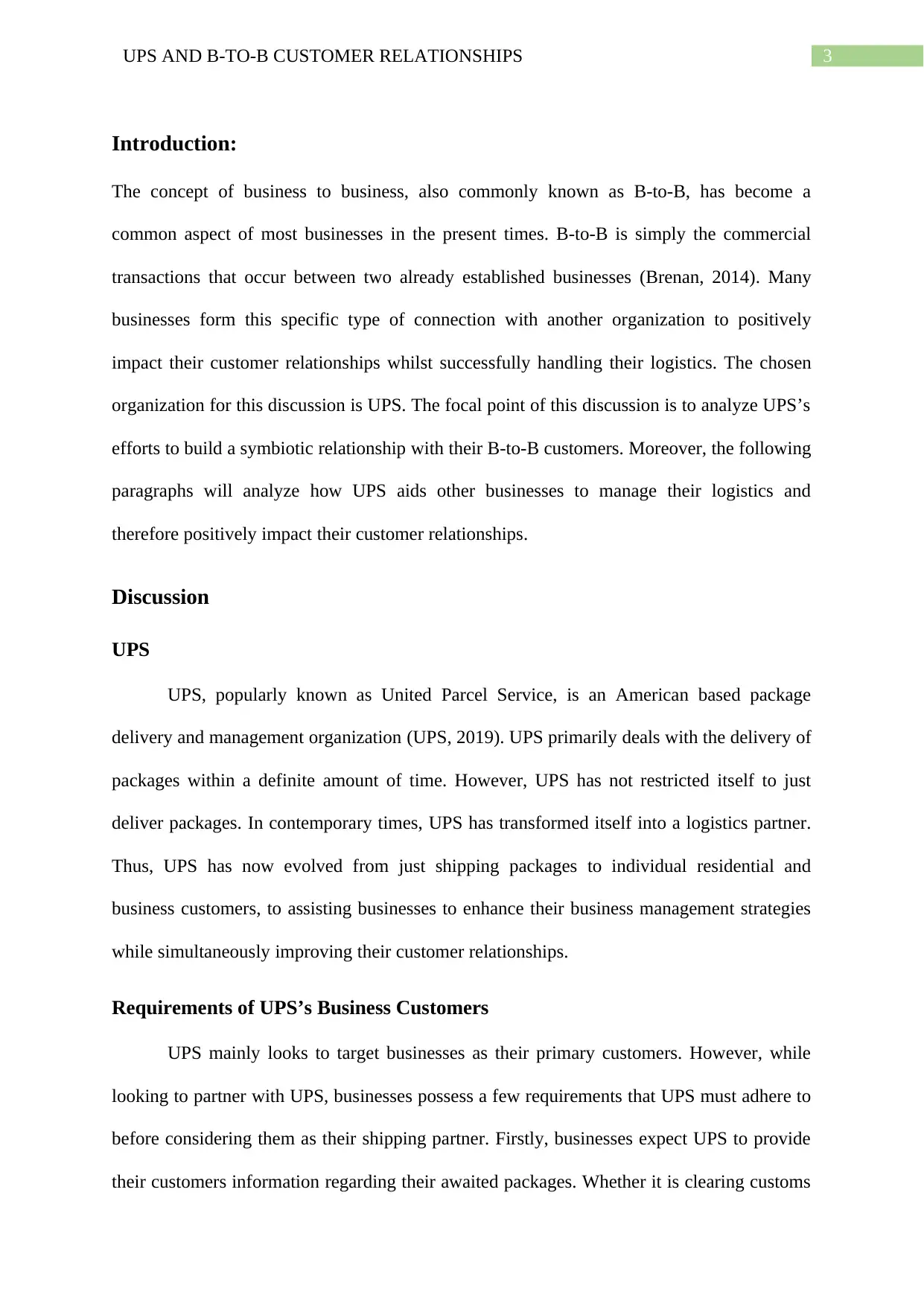
3UPS AND B-TO-B CUSTOMER RELATIONSHIPS
Introduction:
The concept of business to business, also commonly known as B-to-B, has become a
common aspect of most businesses in the present times. B-to-B is simply the commercial
transactions that occur between two already established businesses (Brenan, 2014). Many
businesses form this specific type of connection with another organization to positively
impact their customer relationships whilst successfully handling their logistics. The chosen
organization for this discussion is UPS. The focal point of this discussion is to analyze UPS’s
efforts to build a symbiotic relationship with their B-to-B customers. Moreover, the following
paragraphs will analyze how UPS aids other businesses to manage their logistics and
therefore positively impact their customer relationships.
Discussion
UPS
UPS, popularly known as United Parcel Service, is an American based package
delivery and management organization (UPS, 2019). UPS primarily deals with the delivery of
packages within a definite amount of time. However, UPS has not restricted itself to just
deliver packages. In contemporary times, UPS has transformed itself into a logistics partner.
Thus, UPS has now evolved from just shipping packages to individual residential and
business customers, to assisting businesses to enhance their business management strategies
while simultaneously improving their customer relationships.
Requirements of UPS’s Business Customers
UPS mainly looks to target businesses as their primary customers. However, while
looking to partner with UPS, businesses possess a few requirements that UPS must adhere to
before considering them as their shipping partner. Firstly, businesses expect UPS to provide
their customers information regarding their awaited packages. Whether it is clearing customs
Introduction:
The concept of business to business, also commonly known as B-to-B, has become a
common aspect of most businesses in the present times. B-to-B is simply the commercial
transactions that occur between two already established businesses (Brenan, 2014). Many
businesses form this specific type of connection with another organization to positively
impact their customer relationships whilst successfully handling their logistics. The chosen
organization for this discussion is UPS. The focal point of this discussion is to analyze UPS’s
efforts to build a symbiotic relationship with their B-to-B customers. Moreover, the following
paragraphs will analyze how UPS aids other businesses to manage their logistics and
therefore positively impact their customer relationships.
Discussion
UPS
UPS, popularly known as United Parcel Service, is an American based package
delivery and management organization (UPS, 2019). UPS primarily deals with the delivery of
packages within a definite amount of time. However, UPS has not restricted itself to just
deliver packages. In contemporary times, UPS has transformed itself into a logistics partner.
Thus, UPS has now evolved from just shipping packages to individual residential and
business customers, to assisting businesses to enhance their business management strategies
while simultaneously improving their customer relationships.
Requirements of UPS’s Business Customers
UPS mainly looks to target businesses as their primary customers. However, while
looking to partner with UPS, businesses possess a few requirements that UPS must adhere to
before considering them as their shipping partner. Firstly, businesses expect UPS to provide
their customers information regarding their awaited packages. Whether it is clearing customs
Paraphrase This Document
Need a fresh take? Get an instant paraphrase of this document with our AI Paraphraser
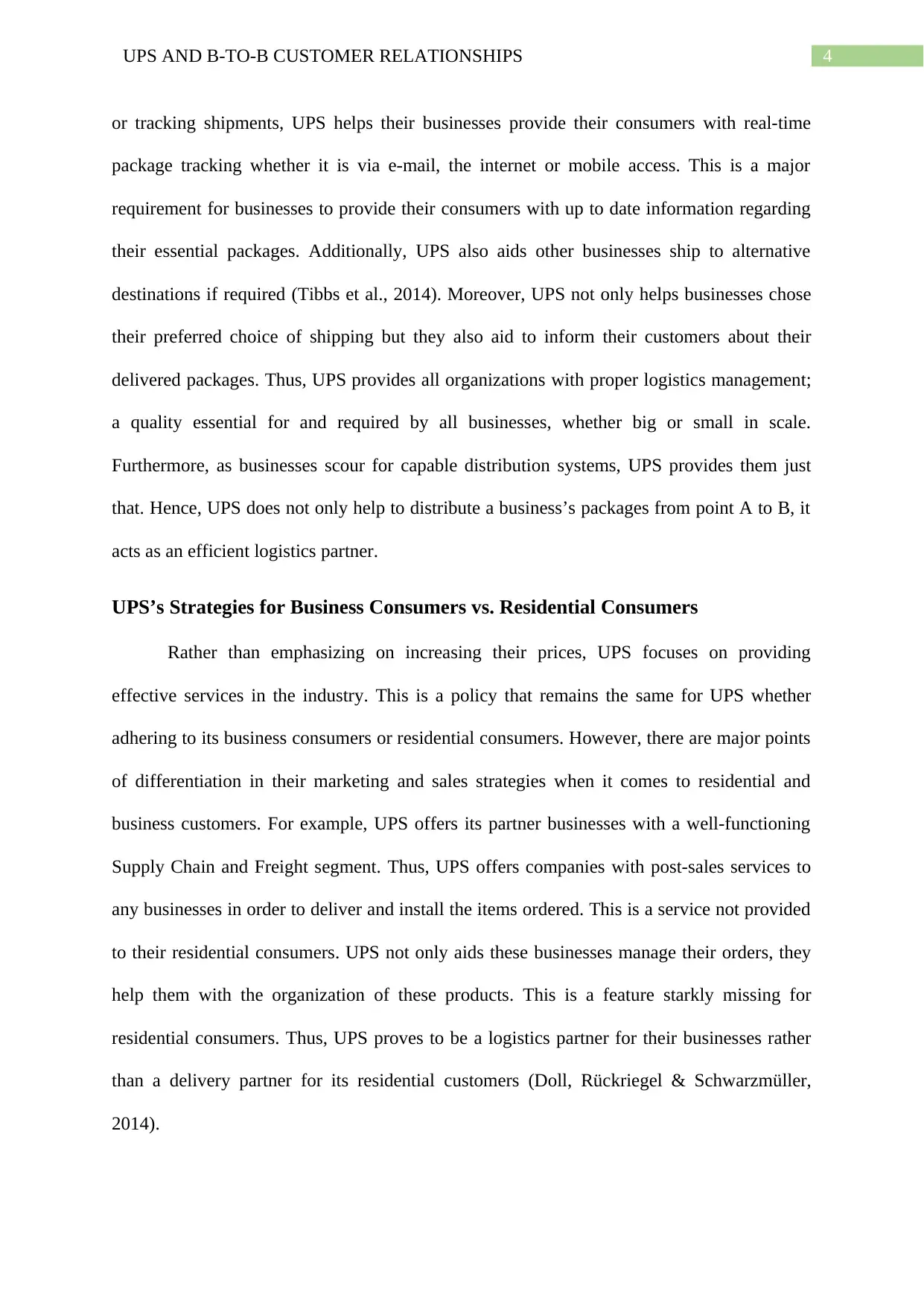
4UPS AND B-TO-B CUSTOMER RELATIONSHIPS
or tracking shipments, UPS helps their businesses provide their consumers with real-time
package tracking whether it is via e-mail, the internet or mobile access. This is a major
requirement for businesses to provide their consumers with up to date information regarding
their essential packages. Additionally, UPS also aids other businesses ship to alternative
destinations if required (Tibbs et al., 2014). Moreover, UPS not only helps businesses chose
their preferred choice of shipping but they also aid to inform their customers about their
delivered packages. Thus, UPS provides all organizations with proper logistics management;
a quality essential for and required by all businesses, whether big or small in scale.
Furthermore, as businesses scour for capable distribution systems, UPS provides them just
that. Hence, UPS does not only help to distribute a business’s packages from point A to B, it
acts as an efficient logistics partner.
UPS’s Strategies for Business Consumers vs. Residential Consumers
Rather than emphasizing on increasing their prices, UPS focuses on providing
effective services in the industry. This is a policy that remains the same for UPS whether
adhering to its business consumers or residential consumers. However, there are major points
of differentiation in their marketing and sales strategies when it comes to residential and
business customers. For example, UPS offers its partner businesses with a well-functioning
Supply Chain and Freight segment. Thus, UPS offers companies with post-sales services to
any businesses in order to deliver and install the items ordered. This is a service not provided
to their residential consumers. UPS not only aids these businesses manage their orders, they
help them with the organization of these products. This is a feature starkly missing for
residential consumers. Thus, UPS proves to be a logistics partner for their businesses rather
than a delivery partner for its residential customers (Doll, Rückriegel & Schwarzmüller,
2014).
or tracking shipments, UPS helps their businesses provide their consumers with real-time
package tracking whether it is via e-mail, the internet or mobile access. This is a major
requirement for businesses to provide their consumers with up to date information regarding
their essential packages. Additionally, UPS also aids other businesses ship to alternative
destinations if required (Tibbs et al., 2014). Moreover, UPS not only helps businesses chose
their preferred choice of shipping but they also aid to inform their customers about their
delivered packages. Thus, UPS provides all organizations with proper logistics management;
a quality essential for and required by all businesses, whether big or small in scale.
Furthermore, as businesses scour for capable distribution systems, UPS provides them just
that. Hence, UPS does not only help to distribute a business’s packages from point A to B, it
acts as an efficient logistics partner.
UPS’s Strategies for Business Consumers vs. Residential Consumers
Rather than emphasizing on increasing their prices, UPS focuses on providing
effective services in the industry. This is a policy that remains the same for UPS whether
adhering to its business consumers or residential consumers. However, there are major points
of differentiation in their marketing and sales strategies when it comes to residential and
business customers. For example, UPS offers its partner businesses with a well-functioning
Supply Chain and Freight segment. Thus, UPS offers companies with post-sales services to
any businesses in order to deliver and install the items ordered. This is a service not provided
to their residential consumers. UPS not only aids these businesses manage their orders, they
help them with the organization of these products. This is a feature starkly missing for
residential consumers. Thus, UPS proves to be a logistics partner for their businesses rather
than a delivery partner for its residential customers (Doll, Rückriegel & Schwarzmüller,
2014).
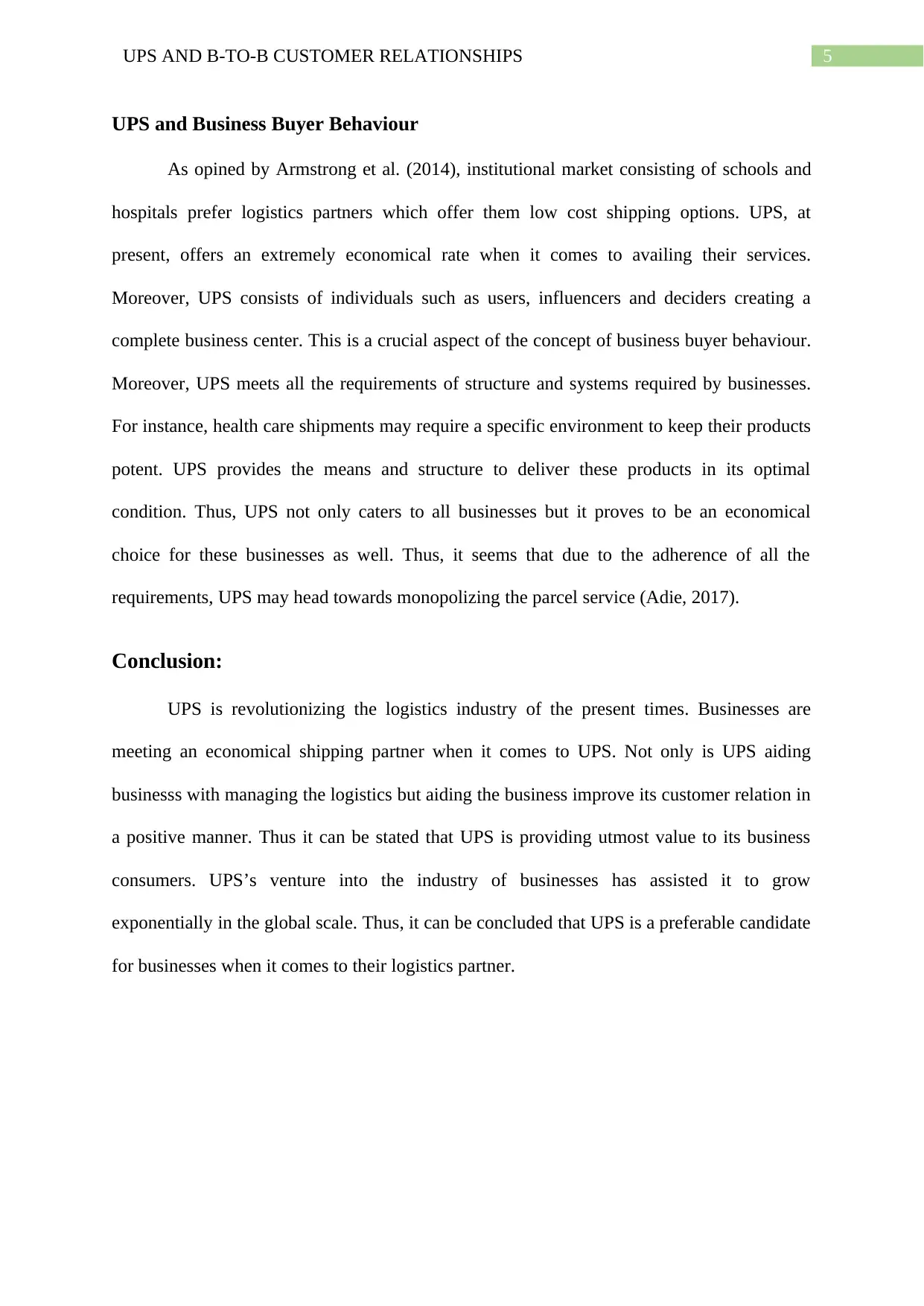
5UPS AND B-TO-B CUSTOMER RELATIONSHIPS
UPS and Business Buyer Behaviour
As opined by Armstrong et al. (2014), institutional market consisting of schools and
hospitals prefer logistics partners which offer them low cost shipping options. UPS, at
present, offers an extremely economical rate when it comes to availing their services.
Moreover, UPS consists of individuals such as users, influencers and deciders creating a
complete business center. This is a crucial aspect of the concept of business buyer behaviour.
Moreover, UPS meets all the requirements of structure and systems required by businesses.
For instance, health care shipments may require a specific environment to keep their products
potent. UPS provides the means and structure to deliver these products in its optimal
condition. Thus, UPS not only caters to all businesses but it proves to be an economical
choice for these businesses as well. Thus, it seems that due to the adherence of all the
requirements, UPS may head towards monopolizing the parcel service (Adie, 2017).
Conclusion:
UPS is revolutionizing the logistics industry of the present times. Businesses are
meeting an economical shipping partner when it comes to UPS. Not only is UPS aiding
businesss with managing the logistics but aiding the business improve its customer relation in
a positive manner. Thus it can be stated that UPS is providing utmost value to its business
consumers. UPS’s venture into the industry of businesses has assisted it to grow
exponentially in the global scale. Thus, it can be concluded that UPS is a preferable candidate
for businesses when it comes to their logistics partner.
UPS and Business Buyer Behaviour
As opined by Armstrong et al. (2014), institutional market consisting of schools and
hospitals prefer logistics partners which offer them low cost shipping options. UPS, at
present, offers an extremely economical rate when it comes to availing their services.
Moreover, UPS consists of individuals such as users, influencers and deciders creating a
complete business center. This is a crucial aspect of the concept of business buyer behaviour.
Moreover, UPS meets all the requirements of structure and systems required by businesses.
For instance, health care shipments may require a specific environment to keep their products
potent. UPS provides the means and structure to deliver these products in its optimal
condition. Thus, UPS not only caters to all businesses but it proves to be an economical
choice for these businesses as well. Thus, it seems that due to the adherence of all the
requirements, UPS may head towards monopolizing the parcel service (Adie, 2017).
Conclusion:
UPS is revolutionizing the logistics industry of the present times. Businesses are
meeting an economical shipping partner when it comes to UPS. Not only is UPS aiding
businesss with managing the logistics but aiding the business improve its customer relation in
a positive manner. Thus it can be stated that UPS is providing utmost value to its business
consumers. UPS’s venture into the industry of businesses has assisted it to grow
exponentially in the global scale. Thus, it can be concluded that UPS is a preferable candidate
for businesses when it comes to their logistics partner.
⊘ This is a preview!⊘
Do you want full access?
Subscribe today to unlock all pages.

Trusted by 1+ million students worldwide
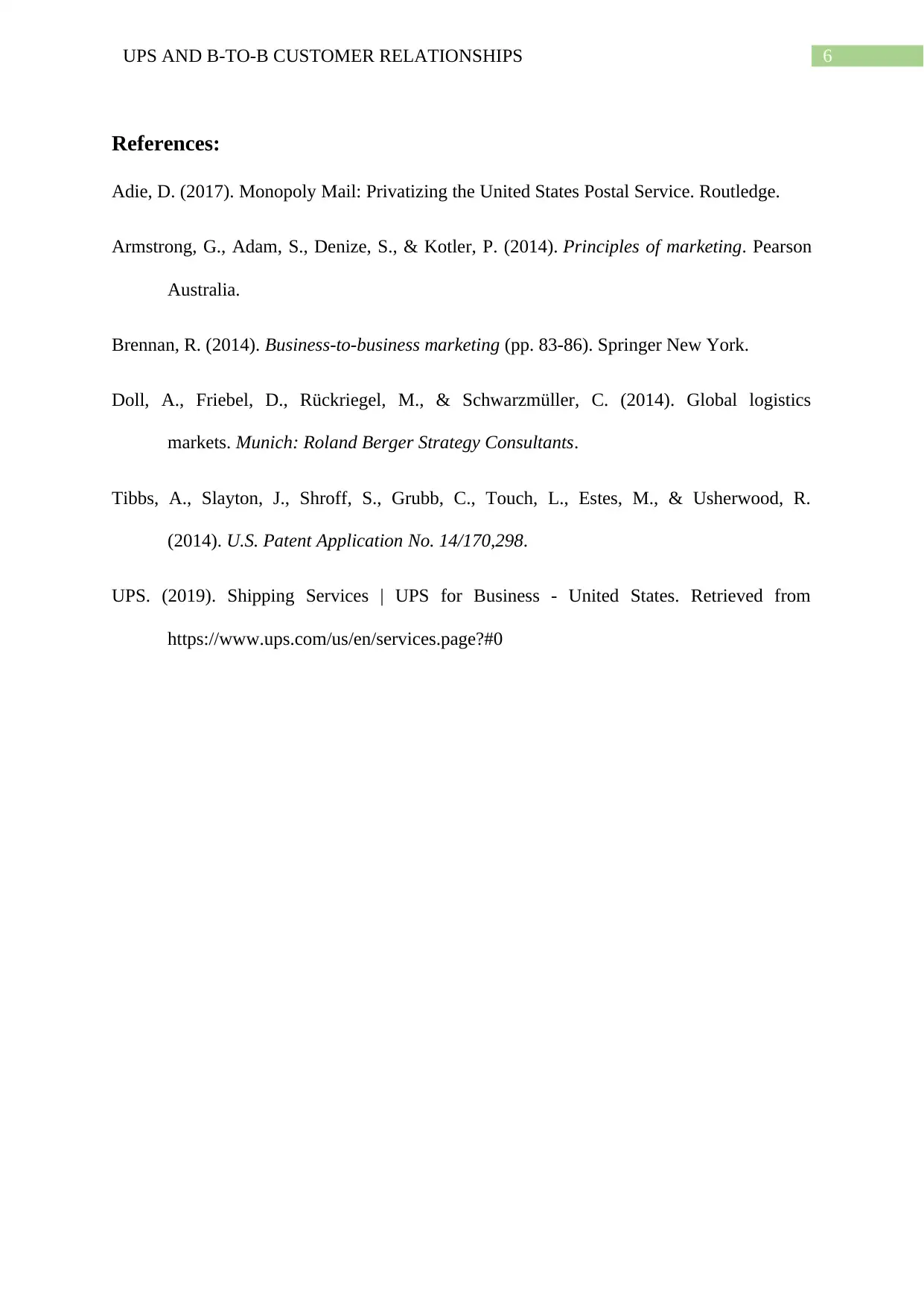
6UPS AND B-TO-B CUSTOMER RELATIONSHIPS
References:
Adie, D. (2017). Monopoly Mail: Privatizing the United States Postal Service. Routledge.
Armstrong, G., Adam, S., Denize, S., & Kotler, P. (2014). Principles of marketing. Pearson
Australia.
Brennan, R. (2014). Business-to-business marketing (pp. 83-86). Springer New York.
Doll, A., Friebel, D., Rückriegel, M., & Schwarzmüller, C. (2014). Global logistics
markets. Munich: Roland Berger Strategy Consultants.
Tibbs, A., Slayton, J., Shroff, S., Grubb, C., Touch, L., Estes, M., & Usherwood, R.
(2014). U.S. Patent Application No. 14/170,298.
UPS. (2019). Shipping Services | UPS for Business - United States. Retrieved from
https://www.ups.com/us/en/services.page?#0
References:
Adie, D. (2017). Monopoly Mail: Privatizing the United States Postal Service. Routledge.
Armstrong, G., Adam, S., Denize, S., & Kotler, P. (2014). Principles of marketing. Pearson
Australia.
Brennan, R. (2014). Business-to-business marketing (pp. 83-86). Springer New York.
Doll, A., Friebel, D., Rückriegel, M., & Schwarzmüller, C. (2014). Global logistics
markets. Munich: Roland Berger Strategy Consultants.
Tibbs, A., Slayton, J., Shroff, S., Grubb, C., Touch, L., Estes, M., & Usherwood, R.
(2014). U.S. Patent Application No. 14/170,298.
UPS. (2019). Shipping Services | UPS for Business - United States. Retrieved from
https://www.ups.com/us/en/services.page?#0
1 out of 7
Related Documents
Your All-in-One AI-Powered Toolkit for Academic Success.
+13062052269
info@desklib.com
Available 24*7 on WhatsApp / Email
![[object Object]](/_next/static/media/star-bottom.7253800d.svg)
Unlock your academic potential
Copyright © 2020–2026 A2Z Services. All Rights Reserved. Developed and managed by ZUCOL.




